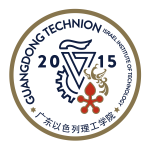
Peng Xu
Professor, Chemical Engineering Program
Dean of Research
Office: R622, North Campus
Research Group Website: Xu SynBio Group
Peng Xu, professor of Chemical Engineering at Guangdong-Technion, Israel Institute of Technology. Dr. Xu obtained his BS/MS from Jiangnan University, and PhD in Chemical and Biological Engineering from Rensselaer Polytechnic Institute, completed his postdoc training at MIT, was a tenure-track Assistant Professor at University of Maryland. He served on the editorial board for the journal Current Opinion in Biotechnology and Metabolic Engineering and is the associate editor for Process Biochemistry and New Biotechnology. His lab was funded by the NSF, the Bill and Melinda Gates Foundation (BMGF), NSFC and the Li Ka–shing Foundation et al. He has received the Biotechnology & Bioengineering Daniel IC Wang Award and the Biochemical Engineering Journal Young Investigator Award. His research covers metabolic engineering, synthetic biology, intelligent control, green manufacturing and biochemical engineering et al.
Google scholar profile: https://scholar.google.com/citations?user=vqLnxtEAAAAJ&hl=en
Xu Peng Research Group: The Synthetic Biology and Intelligent Control Lab
- Chemical biology, metabolic engineering and synthetic biology
- Feedback control theory, gene circuits and bio-intelligent design
- Bio-computing based on biochemical reaction network
- Yeast genome engineering and genome evolution
- Natural product synthesis and human/animal gut health
- C1/C2 feedstock utilization
Gu Y, Jiang Y, Li C, et al, Xu P*and Huang H. (2024) High titer production of gastrodin enabled by systematically refactoring yeast genome with an antisense-transcriptional regulation toolkit. Metabolic Engineering.82, 250-261.
Azi F, Wang Z, Chen W, Lin D and Xu P*. (2023) Developing Ganoderma lucidum as a next-generation cell factory for food and nutraceuticals. Trends in Biotechnology. 42(2), 197-211.
Xu P*. (2021) Dynamics of microbial competition, commensalism and cooperation and its implications for coculture and microbiome engineering. Biotechnology and Bioengineering. 118 (1), 199-209.
Lv Y, Gu Y, Xu J, Zhou J and Xu P*. (2020) Coupling metabolic addiction with negative autoregulation to improve strain stability and pathway yield. Metabolic Engineering. 61, 79-88.
Zeng Y, Hong Y, et al, and Xu P*. (2022) Advanced genome-editing technologies enable rapid and large-scale generation of genetic variants for strain engineering and synthetic biology. Current Opinion in Microbiology69, 102175.
Liu Y and Xu P*. (2022) Quantitative and analytical tools to analyze the spatiotemporal population dynamics of microbial consortia. Current opinion in Biotechnology. 76, 102754.
Ma, Y. Gu, Xu P*. (2022) Biosynthesis of cannabinoid precursor olivetolic acid in genetically engineered Yarrowia lipolytica. Communications Biology5 (1), 1-7.
Gu Yand Xu P*. (2021) Synthetic yeast brews neuroactive compounds. Nature Chemical Biology.17, 8-9.
Xu P* (2020). Analytical solution for a hybrid Logistic-Monod cell growth model in batch and CSTR culture. Biotechnology and Bioengineering. 117(3): 873-878.
Xu P, Qiao K, Ahn WK and Stephanopoulos G*. (2016) Engineering Yarrowia lipolyticaas a platform for synthesis of drop-in transportation fuels and oleochemicals. Proceedings of the National Academy of Sciences, U.S.A., 113(39): 10848–53.
